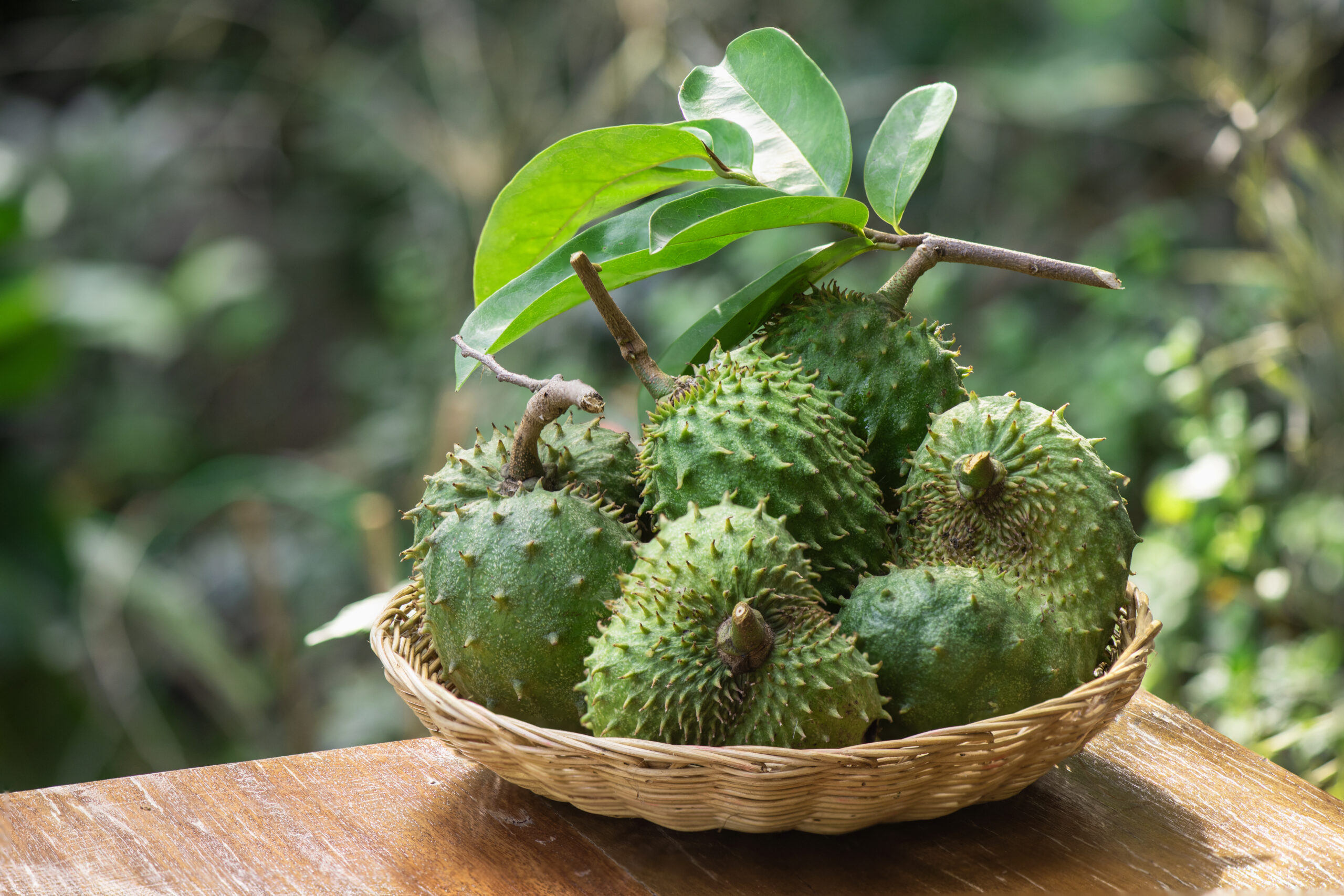
In the lush tropical regions of the world, a remarkable fruit known as soursop is revered for its unique flavor and powerful health benefits. Also known as graviola, this fruit comes from the Annona muricata tree and has been used for centuries in traditional medicine for its medicinal properties.
In this post, we discuss soursop and all its health-boosting properties.
Soursop: Nutrient Rich Profile
Soursop is packed with essential nutrients that contribute to its health-promoting properties. It is rich in vitamin C, an antioxidant that helps boost the immune system and protect against oxidative damage. The fruit also contains significant amounts of vitamins B1, B2, and B3, as well as minerals like potassium, magnesium, and iron, which are vital for overall health and well-being.
- Vitamin C: Known for its immune-boosting properties, vitamin C is also essential for collagen production, wound healing, and iron absorption.
- Vitamin B1 (Thiamine): Important for energy metabolism, thiamine helps convert carbohydrates into energy and plays a role in nerve function.
- Vitamin B2 (Riboflavin): Involved in energy production, riboflavin helps convert food into energy and acts as an antioxidant.
- Vitamin B3 (Niacin): Niacin is essential for DNA repair, energy metabolism, and the production of hormones.
- Potassium: An electrolyte that helps regulate fluid balance, potassium is also important for muscle contractions and nerve function.
- Magnesium: Involved in over 300 biochemical reactions in the body, magnesium plays a role in energy production, muscle function, and nerve signaling.
- Iron: Essential for the production of hemoglobin, which carries oxygen in the blood, iron is also important for energy production and immune function.
Soursop is an Antioxidant Powerhouse
One of the key health benefits of soursop is its high antioxidant content. Antioxidants help protect the body against free radicals, which are unstable molecules that can damage cells and contribute to aging and disease. Soursop contains a variety of antioxidants, including flavonoids, alkaloids, and acetogenins, which have been studied for their potential anti-cancer properties.
- Flavonoids: These antioxidants are known for their anti-inflammatory, antiviral, and anticancer properties. They may also help improve heart health by reducing the risk of cardiovascular disease.
- Alkaloids: Alkaloids have been studied for their potential to fight cancer cells and inhibit tumor growth. They may also have antimicrobial and anti-inflammatory effects.
- Acetogenins: These compounds have been extensively researched for their potential anticancer properties, particularly in relation to breast and prostate cancer. They may also have pesticidal and antiparasitic effects.
Anti-Inflammatory Properties of Soursop
Inflammation is a natural immune response, but chronic inflammation can lead to various health issues. Soursop has been found to possess anti-inflammatory properties, which may help reduce inflammation in the body and lower the risk of chronic diseases such as heart disease, diabetes, and cancer.
Chronic inflammation is linked to the development of many chronic diseases, including heart disease, diabetes, and cancer. It can also contribute to conditions such as arthritis and autoimmune disorders. By reducing inflammation, soursop may help lower the risk of these diseases and improve overall health. The anti-inflammatory properties of soursop are attributed to its high levels of antioxidants and other compounds that help combat inflammation in the body.

Potential Anti-Cancer Effects
One of the most intriguing aspects of soursop is its potential anti-cancer effects. Several studies have shown that soursop extract can inhibit the growth of cancer cells and induce apoptosis, or programmed cell death, in cancer cells. These effects are believed to be due to the presence of acetogenins, a group of natural compounds found in soursop that have been studied for their potential anti-cancer properties.
Acetogenins have been shown to inhibit the production of adenosine triphosphate (ATP) in cancer cells, which is essential for their survival. By disrupting ATP production, acetogenins can induce apoptosis in cancer cells, leading to their death. Additionally, acetogenins have been found to inhibit the activity of enzymes involved in cell division, which can help slow the growth of tumors.
Case Study: Soursop Extract and Breast Cancer
A study published in the journal “Nutrition and Cancer” investigated the effects of soursop extract on breast cancer cells. The researchers treated human breast cancer cells with different concentrations of soursop extract and found that the extract inhibited the growth of the cancer cells in a dose-dependent manner. The study also showed that soursop extract induced apoptosis, or programmed cell death, in the breast cancer cells.
The researchers further examined the mechanisms behind these effects and found that soursop extract downregulated the expression of genes associated with cancer cell survival and proliferation. These findings suggest that soursop extract may have potential as a natural treatment for breast cancer.
Source:
While these studies are promising, more research is needed to fully understand the mechanisms behind soursop’s anti-cancer effects and determine its potential as a cancer treatment. Clinical trials are underway to investigate the use of soursop extract in cancer therapy, and early results are encouraging. Soursop shows promise as a natural alternative or complementary therapy for cancer treatment, but further research is needed to validate its efficacy and safety.
How Soursop Supports Digestive Health
Soursop’s high fiber content is beneficial for digestive health as it promotes regular bowel movements and prevents constipation. Fiber adds bulk to the stool, making it easier to pass through the digestive tract. Additionally, soursop contains natural compounds such as tannins and alkaloids, which may help reduce stomach acidity and alleviate digestive issues such as indigestion and acid reflux.
Furthermore, soursop’s anti-inflammatory properties may help reduce inflammation in the digestive tract, which can contribute to digestive issues. By incorporating soursop into your diet, you may be able to improve your digestive health and overall well-being.

How to Enjoy Soursop
Soursop can be enjoyed in various ways to reap its health benefits. The fruit can be eaten fresh, either on its own or added to smoothies, salads, or desserts. Soursop juice is also popular and can be made by blending the fruit with water and straining the mixture. Soursop tea, made from the leaves of the soursop tree, is another way to enjoy this superfruit and is believed to offer similar health benefits.
Soursop Smoothie Recipe
Ingredients:
- 1 cup fresh soursop pulp
- 1 banana
- 1/2 cup coconut water or almond milk
- 1 tablespoon honey or maple syrup (optional)
- Ice cubes (optional)
Instructions:
- Scoop out the flesh from a ripe soursop fruit and remove the seeds.
- Blend the soursop pulp, banana, coconut water or almond milk, and honey or maple syrup until smooth.
- Add ice cubes if desired and blend again until smooth and creamy.
- Pour into a glass and enjoy!
Soursop Salad
Ingredients:
- 1 cup diced fresh soursop pulp
- 1/2 cup diced pineapple
- 1/2 cup diced mango
- 1/4 cup chopped mint leaves
- 1 tablespoon lime juice
- 1 tablespoon honey
Instructions:
- Combine the soursop pulp, pineapple, mango, and mint leaves in a bowl.
- In a separate bowl, mix the lime juice and honey to create a dressing.
- Pour the dressing over the fruit mixture and toss gently to coat.
- Chill in the refrigerator for 30 minutes before serving.
Soursop Tea
Ingredients:
- 1 tablespoon dried soursop leaves
- 1 cup boiling water
- Honey or sugar (optional)
Instructions:
- Place the dried soursop leaves in a teapot or mug.
- Pour boiling water over the leaves and let steep for 5-10 minutes.
- Strain the tea to remove the leaves.
- Add honey or sugar if desired, and enjoy your soursop tea!
Soursop Superfruit: A Tropical Treasure for Health and Wellness
Soursop, also known as graviola, is truly a superfruit with a wide array of health benefits. From its rich nutrient profile to its powerful antioxidant and anti-inflammatory properties, soursop offers a natural way to boost your health and well-being.
Studies have shown that soursop extract may have potential anti-cancer effects, making it a promising avenue for cancer research. Additionally, soursop’s digestive health benefits, along with its versatility in culinary applications, make it a valuable addition to any diet.
Whether enjoyed fresh, blended into smoothies, or brewed into tea, soursop can be a delicious and nutritious part of a healthy lifestyle. By incorporating soursop into your diet, you can take advantage of its many health-boosting properties and enjoy its unique tropical flavor.




